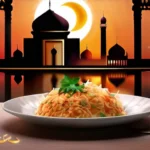Explore the meaning, principles, and significance of halal in Islam
Halal is a term that carries great importance for Muslims worldwide. This article delves into the meaning of halal, its principles, and why it matters in Islamic dietary laws and beyond.
The Origin and Evolution of Halal
The Origin and Evolution of Halal: How did halal, rooted deeply in the Quran, evolve into a cornerstone of modern Islamic practice? It’s like tracing the lineage of a beloved family heirloom through centuries—each era adding its unique layer to the story. Imagine the first revelation to Prophet Muhammad (peace be upon him) as the seed that planted the concept of halal. In Surah Al-Ma’idah, verse 3, Allah commands: ‘O you who believe! Eat from the good things We have provided for your sustenance, but avoid the uncleanness of sinning.’ This command is not just a dietary guideline; it’s a profound instruction on living a life that’s pure and pious.
Over time, as Islam spread beyond its Arabian origins, halal principles were adapted to accommodate diverse cultures while preserving core values. The Prophet Muhammad (peace be upon him) himself set examples through his actions, ensuring the guidance was not just theoretical but practical in daily life. For instance, he would personally slaughter animals, making sure the process was humane and swift—a principle of mercy that continues to guide Islamic practices today.
The evolution continued with the emergence of scholars like Imam Ahmad ibn Hanbal and Imam Malik, who compiled hadiths and fatwas to provide a structured understanding of halal. Their work solidified what was permissible in Islam, ensuring consistency across different regions. As time passed, scholarly consensus (ijma) and analogical reasoning (qiyas) became key tools in interpreting halal, adapting timeless principles to modern contexts.
Today, as the world becomes increasingly interconnected, the significance of halal extends beyond religious observance into realms like global trade, food safety standards, and ethical consumerism. The journey from its Quranic origins to its current relevance is a testament to Islam’s adaptability and enduring wisdom.
‘How has halal evolved over centuries, shaping the way we understand and practice it today?’
Principles Governing Halal
Understanding the principles that govern what is considered halal within Islam is akin to delving into the heart of a deeply intricate tapestry, where every thread is intricately connected and interwoven. These principles are not just guidelines but a framework through which Muslims navigate their daily lives with purpose and integrity.
The role of Islamic law (Shariah) in defining these principles cannot be overstated. Shariah acts as the overarching guide, ensuring that all actions align with the teachings of Islam. One of the key principles is the concept of necessity. This principle suggests that what is halal should meet basic needs and promote well-being. It’s like asking, ‘Is this action necessary for my life?’ or ‘Will it bring me closer to God?’
Another crucial principle is sincerity (ikhlas), which emphasizes the purity of intention. When performing an act that is halal, Muslims are encouraged to do so with a pure and sincere heart, free from any ulterior motives. This could be likened to cooking a meal not just for taste but also as an offering to God, making every effort to please Him.
The principle of avoiding harm (mashoor) is another significant aspect. It encourages Muslims to avoid actions that might cause harm or distress to others, whether physically, emotionally, or spiritually. This is similar to ensuring your words and actions do not hurt anyone, even if it’s unintentional.
The concept of sustainability (tadarruj) also plays a vital role in defining halal principles. It promotes moderation and balance, suggesting that Muslims should avoid extremes and ensure their lifestyle is sustainable both for themselves and the environment around them. This can be seen as planting seeds today to ensure we do not cut down trees for tomorrow’s fire.
The principles of halal are dynamic and ever-evolving, reflecting the changing needs and contexts of society while always grounding in the core values of Islam. By understanding these principles, Muslims aim to live their lives with a sense of purpose and responsibility, ensuring that every action they take is in line with the teachings of their faith.
Halal Dietary Laws: A Closer Look
Imagine diving into a vast ocean, where every wave carries its own significance and meaning. In Islam, the concept of halal is like one such profound wave, guiding believers in their daily lives. Specifically when it comes to dietary laws, these guidelines serve as a filter that purifies our food choices, ensuring they align with the teachings of the Quran and Sunnah.
When we talk about halal animals, it’s almost like entering a sacred garden where every plant has been carefully chosen by divine wisdom. For Muslims, permissible animals are those which are either herbivorous or have been slaughtered in a specific way that is both humane and respectful. The qita, the swift and precise cutting of the animal’s throat with a sharp blade, is crucial for ensuring quick death without causing unnecessary pain.
But why does this matter so much? It’s as if we are taking part in a grand symphony where every note resonates with purpose. The process of slaughter must be swift and precise to minimize the animal’s suffering, symbolizing mercy and compassion—a reminder that even when it comes to death, there is an order and respect.
For instance, cattle, sheep, goats, chickens, and fish are all examples of halal animals. Each one has its specific way of being prepared, ensuring that no part of the animal goes to waste. This isn’t just about what we eat; it’s a reminder of our responsibility towards creation.
Moreover, this practice is not merely a set of rules but a profound act of worship. By following these guidelines, Muslims are not only ensuring their physical health but also engaging in spiritual purity and cleanliness. It’s like weaving a tapestry where every thread—every aspect of halal—is intricately connected to the larger picture.
Understanding and adhering to these dietary laws is more than just about food; it’s about living a life that aligns with the teachings of Islam, making each meal a step towards spiritual growth. So, as we prepare our meals, let us reflect on the significance of halal not only in our lives but also in the broader context of our faith.
The Economic Impact of Halal
Imagine the global market as a vast ocean, teeming with diverse goods and services. Among these, the halal market stands out like a lighthouse guiding ships through choppy waters. But what exactly is this market, and how significant is its impact on Muslim communities worldwide?
The term ‘halal’ translates to permissible in Arabic and refers to anything that aligns with Islamic law. In the economic realm, it encompasses a wide array of products from food to cosmetics, pharmaceuticals, and financial services. The global halal market has grown exponentially over the past decade, reaching an estimated size of billions of dollars annually.
One might wonder, why such a significant growth? The answer lies in the expanding Muslim population and their increasing demand for halal-certified products. This trend is not just confined to traditional food items but extends to every facet of life. From cosmetics that are free from animal-derived ingredients to financial instruments that adhere to Islamic principles, the scope is vast.
The economic benefits for Muslim communities are manifold. Halal certification can open doors to new markets and business opportunities, providing a competitive edge in an increasingly globalized economy. For businesses, ensuring halal compliance not only caters to a growing demographic but also enhances brand reputation and market share.
Moreover, the halal market supports local economies by encouraging indigenous production of halal products. This can lead to job creation and sustainable development in various regions. The demand for halal goods has become so robust that even non-Muslim businesses are now seeking certifications to tap into this lucrative segment.
The question arises: How can we harness the potential of the global halal market to further enhance the economic well-being of Muslim communities? By fostering innovation and collaboration, we can ensure that the halal market continues to grow in both size and significance. This growth not only strengthens the economy but also reinforces the cultural identity and ethical values of Muslims around the world.
Halal Beyond Diet: A Cultural Perspective
Halal, beyond its well-known dietary connotations, holds profound significance in Islamic culture and ethics. It goes far beyond just what you eat; it’s about living a life that is pure, upright, and ethical. Is halal merely a set of rules to follow or does it deeply influence one’s way of living?
At its core, halal represents permissible actions in Islam—actions that are morally good and beneficial for individuals and society at large. This extends into personal ethics, where Muslims strive to uphold principles such as honesty, trustworthiness, and fairness in their dealings with others. How often do we reflect on whether our daily choices align with these values?
In the realm of business, halal certification has become a symbol of ethical practices. It ensures that products are produced without any prohibited substances and meet high standards of hygiene and quality. This commitment to transparency and integrity is crucial in building trust among consumers. Does this mean that a product labeled ‘halal’ automatically ensures its purity and goodness?
The principles of halal can be seen as a guide for every facet of life, from personal interactions to professional conduct. It encourages Muslims to consider the impact of their actions on others and the environment. By practicing these principles, one not only adheres to religious guidelines but also contributes positively to the community. Isn’t it fascinating how integrating halal ethics can transform our daily lives into a continuous act of worship?
Moreover, as globalization brings people from diverse backgrounds together, the recognition and respect for halal practices have grown. This cultural significance fosters unity and mutual understanding, highlighting the universal values that connect all human beings regardless of their faith or belief. How can we leverage this shared value to bridge gaps between different communities?
Ultimately, halal is about making conscious choices that promote a balanced and holistic way of life. It’s not just about what you eat; it’s about how you live, interact, and contribute to the world around you. As we explore its broader implications, let us consider how integrating these ethical practices can enrich our lives and create a more harmonious society.
The Future of Halal: Challenges and Opportunities
The future of halal is like a river that flows through time, carrying the values and principles of Islam into modern landscapes. As we look ahead, several challenges loom on this path—like rocks blocking the flow of a stream. How can the halal industry navigate these obstacles to ensure its continued growth and success?
One major challenge is ensuring food safety and quality control. Imagine a marketplace where every product claims to be halal but some might not meet the standards. This could damage trust, much like a polluted river that kills all life in its path. To overcome this, strict certification processes must be implemented, making sure that every product lives up to the stringent guidelines set by Islamic scholars and institutions.
Educating consumers is another critical task. Just as planting trees can transform barren land into lush forests, educating people about halal principles can turn a skeptical audience into informed supporters. This education should extend beyond religious communities; it’s essential for businesses in sectors like cosmetics, pharmaceuticals, and even technology to understand the demand for halal products.
Moreover, globalization poses its own set of challenges. The halal industry must adapt to diverse markets while maintaining consistency. It’s like a chef preparing a dish that tastes exactly the same when served in different parts of the world—consistent quality no matter where you are. This requires innovation and flexibility from businesses, ensuring that halal products meet local needs and preferences without compromising on core values.
Finally, addressing the issue of misinformation is crucial. In an era where information travels faster than a speeding bullet, spreading accurate knowledge about halal can prevent misunderstandings and promote understanding. This involves engaging with communities through social media, workshops, and partnerships with educational institutions to clarify misconceptions and highlight the positive impact of adhering to halal principles.
By addressing these challenges, the halal industry can continue to thrive, much like a river that finds its way through the landscape, adapting and flowing into new territories. The future is bright as long as we keep moving forward with integrity and commitment.
Conclusion
 By understanding the concept of halal, we gain a deeper appreciation for the values and practices that shape the lives of millions of people around the world.
By understanding the concept of halal, we gain a deeper appreciation for the values and practices that shape the lives of millions of people around the world.











